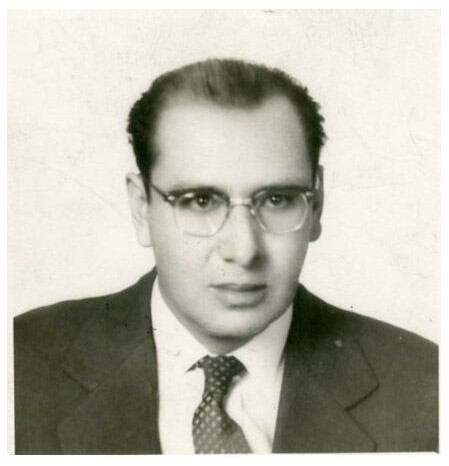Gilberto Molina Correa (Cañar, September 20, 1915 – Unknown) was an Ecuadorian poet, novelist, playwright, short story writer, essayist, and educator. His diverse body of work spanned multiple genres, including notable contributions such as the novel Sismos y abismos (1969), the short story collection Almas conturbadas (1962), and the play Censo sin consenso (1962). He also authored the poetry collection La inefable presencia (1966). He was an influential advocate for educational reform and a school director, serving as head of Escuela Municipal “Joaquín Donoso” in Vinces. Molina Correa left a lasting mark on both Ecuadorian literature and education.
Early Life and Education
Gilberto Molina Correa was born on September 20, 1915, in Cañar, Ecuador. He attended Colegio Manuel J. Calle in Cuenca before studying at the University of Guayaquil. Additionally, he pursued advanced courses in Pedagogy at the University of Río Piedras in Puerto Rico, which laid the groundwork for his career in education and literature. His early life in a small Andean town deeply influenced his work, and he remained committed to Ecuadorian culture and education throughout his career.
Literary Career
Molina Correa had a prolific career as both an educator and writer, producing a wide range of works spanning various genres and topics. His literary output includes essays, short stories, novels, educational treatises, and plays, reflecting his deep engagement with the social, cultural, and political issues of his time.
Among his most notable works are Sismos y abismos (1969), a novel recognized as a significant contribution to Ecuadorian literature during the 1960s, and Almas conturbadas (1962), a collection of short stories that explored the human condition. He also authored educational books like Reforma educativa: rumbo y dinámica en el nivel primario (1968), co-written with Abdon Armas Andrade, which highlighted his commitment to educational reform in Ecuador. His contributions to Ecuadorian literature also included plays such as Censo sin consenso (1963), and essays focusing on literary analysis, such as Enrique Gil Gilbert: notas para un ensayo (1974).
Contributions to Education
In addition to his literary endeavors, Molina Correa was a dedicated educator. He served as the director of Escuela Municipal “Joaquín Donoso” in Vinces, Ecuador. During his tenure, the school faced challenges, including the need to relocate, yet he managed to maintain its operations effectively. His leadership in education is further reflected in his writings on pedagogy and educational reform, including works such as La nueva escuela ecuatoriana (1967) and Las asociaciones de clase (1967). His dedication to improving primary education through progressive methods positioned him as a key figure in Ecuadorian educational circles.
Molina Correa also contributed to national and international newspapers and educational journals, extending his influence beyond Ecuador.
Legacy and Recognition
Gilberto Molina Correa’s work left a lasting mark on Ecuadorian literature and education. His novel Sismos y abismos remains an important piece in the canon of Ecuadorian literature from the 1960s. His contributions to education, both as an educator and through his writings, have cemented his legacy as a reformer and intellectual.
He was recognized for his contributions by various institutions and was affiliated with several academies. He received important recognitions for his work and participated actively in journalistic and educational associations, representing Tungurahua in national assemblies. He also composed the anthem for both the cantón Mocha and the Colegio León Becerra in Tungurahua.
Selected Works
Novels
- Sismos y abismos (1969)
Short Story Collections
- Almas conturbadas (1962)
- La historia de Paquito se hizo un hombre: otros relatos (2005)
Plays
- Censo sin consenso (1962)
- Censo sin consenso (Operación Censo) (1963)
- Teatro (1962)
Essays and Educational Works
- Reforma educativa: rumbo y dinámica en el nivel primario (1968) – co-authored with Abdon Armas Andrade
- La nueva escuela ecuatoriana (1967)
- Las asociaciones de clase (1967)
- Ruta a la escuela (1966)
- Enrique Gil Gilbert: notas para un ensayo (1974)
- Historia de la literatura española (date unknown)
- 1,001 siglas: al cumplirse sesenta años de vida del autor, 25 de septiembre 1915-1975 (1975)
- Héroes de la comunidad mundial (1977)
Poetry
- Cantos ecuatorianos a Bolívar (1983)
- La inefable presencia (1966)
Other Works
- Sostenerse en la cumbre (2005)
- Miguel Angel León: poesía de los elementos y la raza (1965)
- Rielando en la antología de la provincia, la ciudad y su fiesta (1975)
References
- El Universo, “Hoy, un siglo del maestro y escritor Gilberto Molina Correa.” Retrieved on October 22, 2024. Click to view.
- ES Academic, “Gilberto Molina Correa.” Retrieved on October 22, 2024. Click to view.
- PDF Coffee, “El relato ecuatoriano.” Retrieved on October 22, 2024. Click to view.
- Julio Larrea Blogspot, “Julio Larrea, un hombre, un nombre y una obra en la educación mundial.” Retrieved on October 22, 2024. Click to view.
- Google Books, “inauthor:Gilberto Molina Correa.” Retrieved on October 22, 2024. Click to view.

